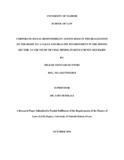| dc.description.abstract | This is a comprehensive study of the contribution of corporate social responsibility to the realization of the right to a clean and healthy environment.The adequacy of the current legal and regulatory framework with regard to CSR is analysed with regard to the role of corporations in ensuring citizens enjoy their right to a clean and healthy environment.There are three key principles used as indicators in this research paper.These principles are;public participation,access to information and access to justice.This study proceeds on a comparative method approach.Whereby a comparison of South Africa and Kenya has been carried out.The impacts of coal mining has been discussed especially with regard to South Africa coal mining industry which has been in existence for over 100 years.This has brought out the positive impacts of coal which are mainly economic.However,the negative impacts of coal are also enormous and this leads to coal being an unsustainable source of energy due to its detrimental effects to the environment people‘s health. In South Africa there are several laws governing the mining sector and the environment,key among them being the MPRDA and NEMA.In Kenya, commercially viable coal was discovered in 2010 and a contract for mining this coal has already been finalized between a Chinese Company and the Kenyan Government.However,in the backdrop of this,an analysis of the legal system in place to guard the interests of the people of Kenya and the environment is weak.A comparison of the study of South Africa and Kenya brings out the fact that coal mining is generally destructive to the environment and human health and Kenya should endeavour to put the right mechanisms in place to ensure that corporations which engage in coal mining adequately engage the interested and affected local communities by explaining about their operations and the impacts of such operations.In summary the devastating effects of coal need proper prior consent of the communities through public participation.In order to curb the devastating effects of coal,stakeholders also need to be supplied with the right information and at the right time and aggrieved parties should be in a position to access justice.It has been noted that these principles are not applied in Kenya,In addition the legal and regulatory framework in Kenya indeed does not anticipate the negative effects of coal mining and therefore does not adequately provide for the same. | en_US |



